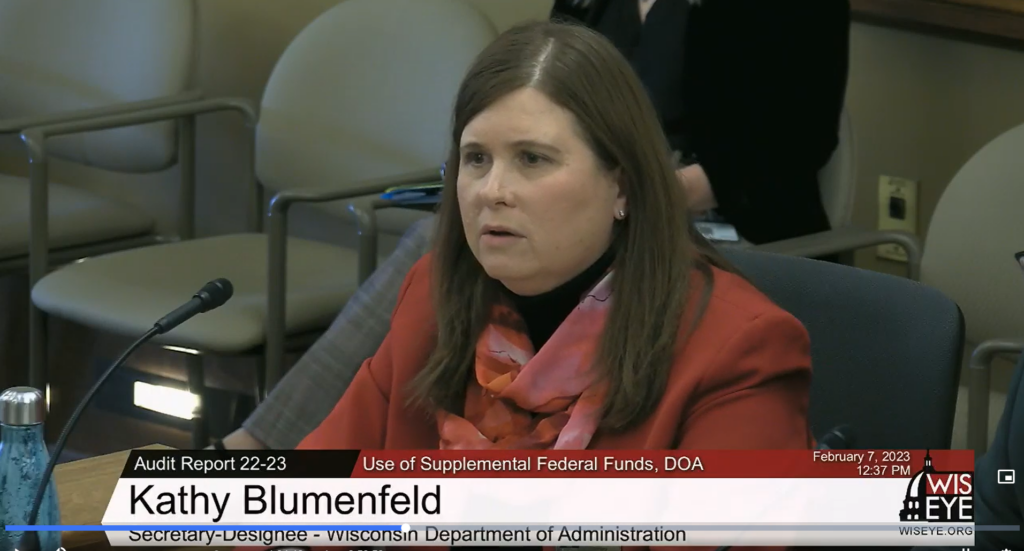GOP Legislators Vote For Audit of State’s Licensing Agency
They cite backlog in approving licenses. Democrats blame inadequate funding and staff.

Department of Administration Secretary-designee Kathy Blumenfeld testifies before the Joint Legislative Audit Committee on Tuesday. (Screenshot | WisEye)
Republican lawmakers on the state Legislature’s audit committee commissioned audits Tuesday of the state’s professional and business licensing agency and of an Evers administration initiative relating to work-at-home arrangements for state employees.
Both audit projects were approved without the votes of the Joint Legislative Audit Committee’s four Democrats, who accused the GOP majority of politicizing what has historically been a bipartisan function of the Legislature.
The votes followed a hearing in which the Republicans grilled the secretary and top aides at the Wisconsin Department of Administration (DOA) about a December audit of the department’s handling of federal pandemic relief funds over the last three years.
That audit recommended that Gov. Tony Evers’ administration and the DOA provide more information about the process used to decide how to distribute $5.7 billion in funds that the state received from the federal government responding to the COVID-19 pandemic.
The new audits commissioned Tuesday focus on issues that have become recurring points of attack aimed at the Evers administration.
One is a persistent backlog in issuing occupational licenses at the Department of Safety and Professional Services (DSPS). There have been similar complaints about the department’s inspection and licensing process for building safety. Both DSPS functions were the subject of separate legislative study committees that met in 2022 after the last legislative floor session in early March.
The other issue involves the state’s work-from-home arrangements, most of them implemented with the onset of the pandemic in the spring of 2020. Republicans have criticized the administration for letting those arrangements continue, often with the implication that state employees who aren’t in state offices aren’t working.
And both subjects have overlapped. At hearings last year by the study committee reviewing the state’s occupational licensing backlog, Rep. Shae Sortwell (R-Two Rivers), the study committee’s vice chair, several times questioned DSPS aides about the department’s practice of having employees work from home since the pandemic’s start, asking whether that might be a factor in the backlog.
Pandemic spending audit
The bulk of Tuesday’s four-hour meeting was spent focusing on the Evers administration’s distribution of funds from the three federal pandemic relief bills: the 2021 American Rescue Plan Act (ARPA), the March 2020 Coronavirus Aid, Relief, and Economic Security (CARES) Act and the December 2020 Consolidated Appropriations Act.
According to the December audit report, auditors asked the DOA to provide documentation of the administration’s process for allocating the money.
DOA provided memorandums of understanding that the department had with other state departments, along with other communications, such as the application processes for grant programs and public announcements seeking applications for grants.
But when the audit bureau requested material such as meeting agendas and minutes that would shed light on decisions of how to allocate the funds, DOA responded that those documents did not exist.
At Tuesday’s hearing, Rep. Robert Wittke (R-Racine) brought up the original audit scope statement, issued in February 2022, that laid out what auditors would want.
The statement said the audit would seek information on how the federal funds were allocated, Wittke told DOA Secretary-designee Kathy Blumenfeld. He quoted her reply at the time that the agency was “confident” it could comply.
“Now you’re coming back to us and telling us, ‘We don’t have this documentation,’” Wittke said. “Why wasn’t that noted in here?”
At DOA, Bluemenfeld said, “It was our thought that all the documentation coming out of those meetings” — the memorandums, grant and applicant criteria and related information — were “the outcome of those discussions. That was the documentation.”
She acknowledged, however, that since the audit report, “we’ve had very valuable insight” about the need to produce more such documentation of such a decision-making process in the future.
Defending the administration
Especially early in the pandemic, decisions were “fluid” and it was “complicated … to document it,” said Chris Patton, DOA deputy secretary. “I think in hindsight, we now realize that, sure, we should have had a process in place in our after-action summary. We should better document it.”
While Republican legislators pressed the DOA witnesses repeatedly on that absence of documentation, Democrats returned again and again to the pandemic, praising the Evers administration’s handling of the crisis.
Underscoring what she called the DOA’s “effective allocation of these funds during this unprecedented time,” Rep. Francesca Hong (D-Madison) asked State Auditor Joe Chrisman, “Did the bureau find any serious material violation … during the distribution and the time that they had to allocate these funds to those who needed it?”
Chrisman responded that misappropriation wasn’t “the question we were attempting to answer,” but when Hong questioned him further, added that the audit bureau had “no finding of statutory noncompliance” in how the money was spent.
The audit comes against a backdrop of a running feud between the Republican leaders in the Legislature and Evers over how the pandemic funds should be spent.
Evers vetoed repeated Republican attempts to direct some of Wisconsin’s $2.5 billion in ARPA money, citing a longstanding state law that largely delegates to the governor the management of federal funds that come to the state. Republicans are now pursuing a constitutional amendment that would end the governor’s unilateral control of those funds.
Proposed audits divide committee
The proposed audit on work-from-home and related matters for state employees will also focus on DOA. Chrisman described the proposal as an examination of existing work-from-home practices for state workers as well as the implications of rethinking where work takes place, including potential real estate savings as well as risks associated with work outside the office.
It also will encompass a look at the Evers administration’s “Vision 2030” proposal that considers what the state workforce and workplace might look like in the years to come.
“If anything,” Blumenfeld told the committee, “through the complexities of the pandemic we were able to show how the transition to alternative work patterns can provide many workforce solutions, help us move toward modernization and ensure the state workforce is resilient and ready to face future challenges, while providing high quality services that Wisconsinites expect and deserve.”
Audit committee Democrats didn’t question that audit proposal. Even before the meeting began Tuesday morning, however, they sent a letter to the audit committee’s co-chairs, Wittke and Sen. Eric Wimberger (R-Green Bay), decrying the other proposed audit targeting DSPS.
Republican lawmakers ramped up criticism of the department a year ago over backlogged occupational license applications. Legislative Democrats and representatives of some of the professions confronting those backlogs have pushed back, blaming the failure of the GOP majority to fund the department even as applications have ballooned.
Occupational license application fees cover the costs of the department’s work, but its staffing levels are controlled by the Legislature. The Wisconsin State Journal reported Tuesday that DSPS has amassed a $47 million surplus — money it cannot spend to hire more people without the Legislature’s approval.
“We operate with the fees we collect from our customers and we receive no general fund tax dollars for our operations,” DSPS Secretary-designee Dan Hereth told the committee Tuesday. “We currently have healthy reserves that I would like to invest in our processes to continue to build that capacity so that we can do our statutorily required work more quickly and efficiently.”
Hereth said his department would cooperate with the audit bureau and the committee.
But in their letter the Democratic audit committee members told Wimberger and Wittke the audit risked “hindering the expeditious modernization efforts that are already underway, and wasting more taxpayer dollars in search of a solution that is already readily apparent and has been for years.”
Several Democrats sought reassurances from Chrisman that the proposed audit would delve into the mismatch between the funds license applications generate and the personnel that the department has been authorized to hire. Chrisman’s answers suggested that the audit would cover those kinds of questions.
Nonetheless, when the time came to vote, Democrats voted against both audit proposals.
“It’s a shame that we needed to have this audit done,” said Sen. Tim Carpenter (D-Milwaukee) just before the vote on the DSPS audit. “We could have taken care of the problem ourselves.”
After the meeting, Carpenter said he and his colleagues voted against both audits because “we kind of saw the two connected” in the attacks on the DOA. He called Tuesday’s questioning by Wittke and Wimberger “over the top” and a deterioration from what was once a bipartisan committee. “The tone of the meeting doesn’t send us in a good direction,” he added.
“An audit [of DSPS] is not going to find what we don’t already know, which is they have been unable to use a surplus of revenue fees,” Hong told the Wisconsin Examiner. “Republicans have obstructed and flat out refused to fully authorize requests for additional staff and resources from DSPS.”
Hong, now in her second term, said that the audit committee has become more partisan rather than working to seek improvements in the government’s operations. “The Republican co-chairs are trying to score political points and not look at actual improvements in efficiencies of our agencies,” she said.
Democrats balk as committee assigns audit of state licensing department was originally published by Wisconsin Examiner



















